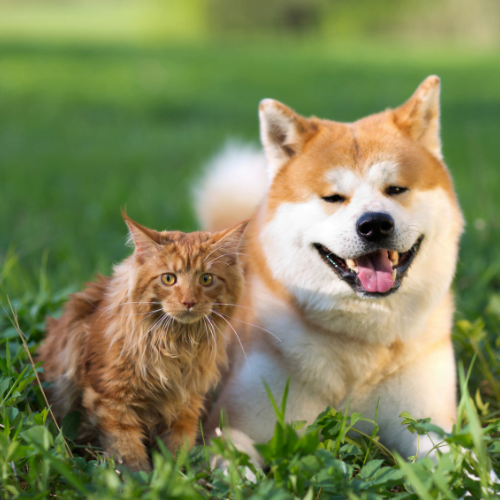Estimated reading time: 4 minutes
Are cats smarter than dogs? This age-old question has been a topic of debate among pet lovers and animal experts alike for years. In this article, we’ll dive into the world of feline and canine intelligence, comparing their cognitive abilities and exploring the unique ways they both demonstrate their smarts. So, whether you’re a devoted cat person or a die-hard dog fan, stick around and let’s find out together!
Brain Size Matters (Or Does It?)
When comparing intelligence in animals, brain size is often a key factor. Historically, many have argued that dogs must be smarter than cats because their brains are larger. While it’s true that, on average, the canine brain is bigger than the feline brain, this doesn’t necessarily mean that dogs are more intelligent.
Recent studies have shown that brain size alone is not a clear indicator of intelligence. Instead, researchers look at the number of neurons (nerve cells) in the brain, as well as the structure and connections between these neurons. In this regard, cats have a higher density of neurons in their cerebral cortex, the part of the brain responsible for information processing, decision making, and problem solving. This suggests that cats might have greater cognitive abilities than we previously thought.
Problem Solving Prowess
Now let’s dive into some practical examples of intelligence. Problem-solving skills are a great way to compare the smarts of our furry friends. In various tests, dogs have shown remarkable abilities to solve problems, follow commands, and learn new tasks. In fact, some breeds of dogs, such as Border Collies and Poodles, are known for their exceptional intelligence.
However, cats shouldn’t be underestimated in this department. While they may not demonstrate the same eagerness to please as dogs, cats are quite adept at solving problems that interest them. For example, cats have been observed using tools, opening doors, and even figuring out how to turn on faucets. So, while dogs may be more inclined to show off their smarts, cats are quietly working on their own clever solutions.
Social Intelligence and Emotional Bonding
Dogs are well-known for their social intelligence, forming strong bonds with their human companions and understanding social cues. Their ability to read human emotions, follow our gaze, and respond to our body language is quite impressive.
Cats, on the other hand, have a reputation for being more independent and aloof. However, this doesn’t mean that they lack social intelligence or emotional bonds with their owners. Cats can also read human emotions and respond to our needs, but they may do so in more subtle ways. For example, a cat may choose to sit near you when you’re feeling down or purr to provide comfort. So, while dogs may wear their hearts on their paws, cats have their own way of showing they care.
Trainability and Adaptability
When it comes to trainability, dogs often take the spotlight. With their eagerness to please and ability to learn complex commands, it’s no wonder that dogs excel in this area. From basic obedience training to specialized tasks like search and rescue or service dog work, dogs have proven time and time again that they can be trained to do incredible things.
Cats, however, are often seen as less trainable. But this doesn’t mean they can’t learn new behaviors. With patience, consistency, and positive reinforcement, many cat owners have successfully trained their feline friends to do tricks, walk on a leash, or even use the toilet. The key difference is that cats are more likely to participate in training sessions when it’s on their terms, rather than simply to please their owner.
In terms of adaptability, both cats and dogs demonstrate an ability to adjust to new environments and situations. Dogs, being pack animals, often look to their human family for guidance and support, while cats rely more on their instincts and innate curiosity to navigate new surroundings. Each species showcases a different type of adaptability, making it difficult to definitively say that one is smarter than the other in this regard.
Survival Instincts and Hunting Skills
When discussing the intelligence of cats and dogs, it’s worth considering their natural instincts and hunting abilities. Cats are notorious for their stealth, agility, and precision when stalking and capturing prey. Their hunting skills are honed from a young age, as kittens practice these behaviors through play.
Dogs, while also possessing hunting instincts, often rely more on their pack mentality and strength to take down prey. Certain breeds, like retrievers and pointers, have been specifically bred to assist humans in hunting tasks. In this sense, both cats and dogs possess innate abilities that showcase their intelligence in different ways.
The Verdict – Are Cats Smarter Than Dogs?
The truth is, there’s no definitive answer to this question. Both cats and dogs possess unique cognitive abilities, problem-solving skills, and instincts that showcase their intelligence. While dogs might excel in social intelligence and trainability, cats demonstrate remarkable problem-solving prowess and adaptability.
Ultimately, whether you’re a cat person or a dog person, it’s important to appreciate and celebrate the unique qualities that make each species special. The bond we share with our pets, be they feline or canine, enriches our lives and brings joy to our hearts. So instead of worrying about which pet is smarter, let’s celebrate the incredible companionship and love they bring to our lives.
As an Amazon Associate I earn from qualifying purchases.








